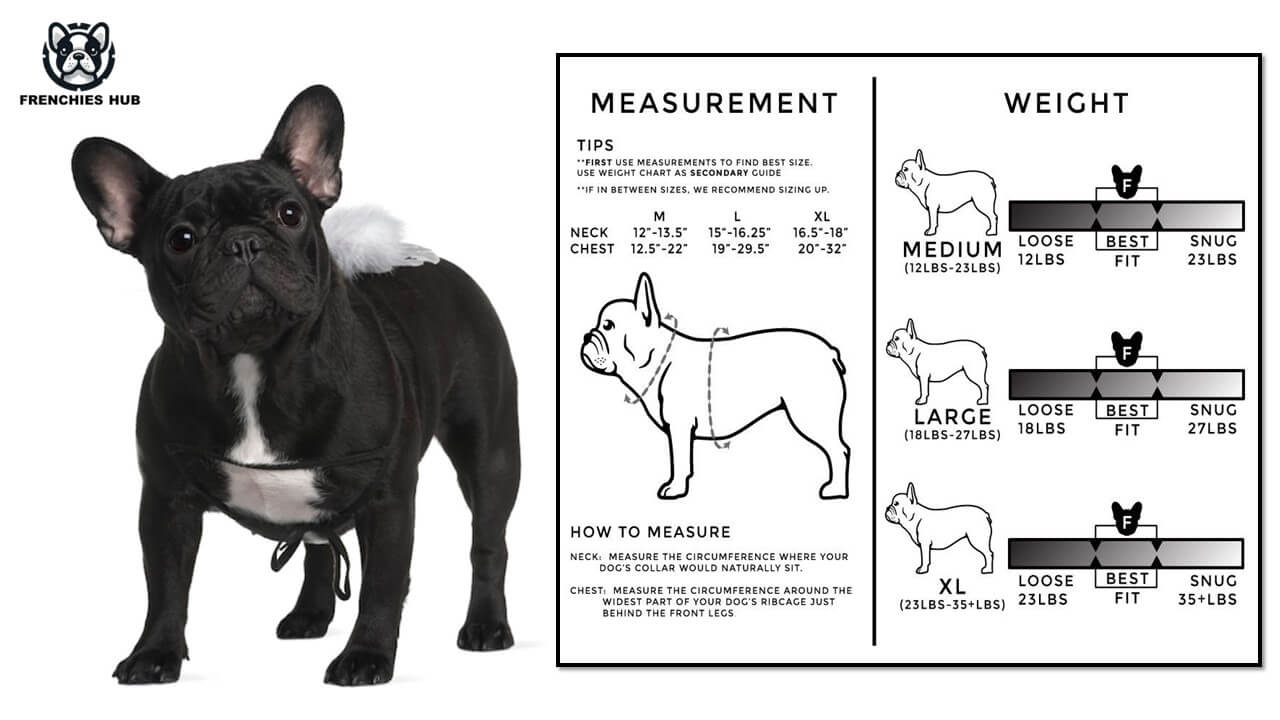French Bulldogs are playful, lovable, and funny companions, known for their social nature and affection towards their families. As a proud owner of a Frenchie, I’ve witnessed firsthand the unique challenges that this breed faces due to its brachycephalic structure, which makes breathing more harder than it is for other dogs. Their compact build does not only contribute to respiratory issues but also predisposes them to gain weight easily.
Managing your French Bulldog’s weight is not just about feeding them the proper amount of food, but also ensuring they get enough activity to stay healthy. Sadly, their tendency to become overweight can lead to obese conditions if not monitored carefully. Through this blog, I aim to help you understand why your Frenchie might be gaining weight and share effective methods to help them lose weight and maintain a fit lifestyle.
Determining Healthy Weight Ranges for French Bulldogs
Determining the ideal weight for a French Bulldog can be a bit of a balancing act. As someone who has been deeply involved with this breed for years, I’ve seen many breeders have a hard time achieving what we call the golden mean between health and bulkiness. These dogs, often referred to as bully or toy breeds, are known for their bulky bodies adorned with sizable quantities of loose skin and robust heads.
The ideal weight of a French Bulldog depends primarily on their age and sex. A female French Bulldog should typically weigh around 16 to 24 pounds, while a male can be a bit heavier, weighing in at about 20 to 28 pounds. Understanding these guidelines can help ensure your Frenchie maintains a healthy balance that avoids the risks associated with excessive bulkiness and promotes overall well-being.
Ideal Weight Chart for French Bulldogs
| Gender | Ideal Weight Range |
| Female | 16 – 24 pounds |
| Male | 20 – 28 pounds |
How to Check If Your French Bulldog Is Overweight
Identifying whether your Frenchie is carrying excess weight can often be discerned through simple manual checks of their body. Owning a French Bulldog myself, I’ve found these guidelines immensely helpful for maintaining my dog’s health.
Start by placing your fingers along the middle of your dog’s back and apply a pressure light enough to feel the ribs. In healthy dogs, ribs should be detectable without pressing too hard; if you’re pressing and mainly feeling fat, it’s likely that your French bulldog is overweight.
Another method involves examining the anatomical view of your pet. A French Bulldog’s chest should be wider than their abdomen. If the reverse is true, and their abdomen appears wider, it’s a sign that your beloved Frenchie might need to lose a few pounds.
Monitoring your dog’s physique through these checks not only ensures you keep them in prime shape but also enhances their overall well-being. As someone who cherishes their lovable canine friend, ensuring they are not overweight is a key aspect of pet care.
Recognizing Overweight Symptoms in French Bulldogs
Understanding whether your French Bulldog is carrying excess weight is crucial for its health and wellbeing. Observing specific symptoms can guide you in taking the necessary steps to ensure a healthy lifestyle for your beloved pet.
Visual Signs of Excess Weight in French Bulldogs
When assessing whether your Frenchie is heavy, a visual inspection can be quite telling. An ideal Frenchie should display an hourglass shape when viewed from above. This means having a visible waist and legs with the spine and rib cage easily palpable under a slight layer of skin and muscle—not buried under extra weight or fat. If the rib cage feels obscured or if it’s difficult to discern the pelvic bone, these are clear indicators that it might be time to reconsider their diet and introduce more controlled feeding plans along with regular vet check-ups.
- Hourglass Figure: Look for a defined waist when viewing from above.
- Feel the Ribs: You should be able to feel the ribs without much effort.
- Check the Pelvic Bone: Difficulty in feeling the pelvic bone indicates too much fat.
Grooming Difficulties Due to Weight
Many French bulldogs struggle to reach certain spots on their bodies to clean themselves, a normal trait for the breed. However, if your Frenchie appears unusually unable to scratch or seems less flexible and struggling to move, this could signify that excess weight is hindering their normal flexibility and movement. Observing these changes in grooming behavior is essential, as they often suggest that your dog has become too tubby. In such cases, considering a diet adjustment and increasing their daily exercise can help improve their mobility and overall health.
- Limited Reach: Notice if they struggle to groom or scratch certain areas.
- Reduced Flexibility: A reduction in flexibility can be a key indicator of excess weight.
- Movement Difficulty: Watch for any struggle in routine movement or playing.
Fatigue from Mild Exertion
Frenchies are not the most athletic breed, and they typically pant and breathe heavily after some exertion. However, if you notice that your dog is getting fatigued much quicker than usual, perhaps tiring from a mere walk of a few blocks, this is a significant sign of being overweight. Early detection of increased fatigue can help you take timely action to manage their health better by adjusting their diet, increasing their exercise routine, and consulting with a veterinarian for a tailored weight management plan.
- Quick Fatigue: Observe if they tire unusually quickly after mild physical activity.
- Heavy Panting: Excessive panting after short walks could signal overweight issues.
- Activity Tolerance: Monitor their ability to tolerate regular walks and playtime.
Effective Weight Loss Strategies for French Bulldogs
To help your French Bulldog reach and maintain a healthy weight, it’s essential to implement a multifaceted approach that includes diet modification, appropriate exercise, and regular monitoring. These strategies are designed to not only reduce excess body fat but also to enhance your Frenchie’s overall health and vitality.
Nutritional Essentials for French Bulldogs
Ensuring your French Bulldog receives healthy nourishment is crucial for maintaining optimal health. Opt for a diet rich in protein, fat, and vitamins that helps maintain their shape without adding unnecessary weight. It’s essential to select food that is free from artificial preservatives and additives, focusing on high-quality ingredients that promote health. Additionally, avoid giving them table scraps, which can contribute to unhealthy weight gain and create nutritional imbalances that might make your pet chubby and less active.
- Quality Ingredients: Choose foods without artificial additives.
- Balanced Diet: Include proteins, fats, and essential vitamins.
- Avoid Scraps: Prevent feeding table scraps to maintain a healthy weight.
Proper Feeding Practices for Healthy Weight
Overfeeding is a common problem, especially with puppies that are still growing. They can quickly gain weight and become susceptible to various diseases and conditions due to excess weight. For adult dogs, particularly the male Frenchie that weighs around 25 pounds, the rule of thumb is about 25 calories per pound per day, which totals around 625 calories. Consistently keeping track of the amount of dry food consumed each day is vital to ensure their weight remains on track and to adjust portions as they age or their activity levels change.
- Monitor Portions: Adjust food quantity according to your dog’s size and activity level.
- Calorie Counting: Ensure about 25 calories per pound per day.
- Regular Checks: Keep a regular check to avoid overfeeding.
Treat Regulation to Avoid Weight Gain
Treats and snacks should only constitute a small portion of your Frenchie’s daily calorie intake, ideally not exceeding 10%. Even small-sized treats can quickly add up, leading to significant weight gain if not monitored closely. Since Frenchies can be fast food scavengers, vigilance is crucial to ensure that scraps from the kitchen or dining table do not become a regular part of their diet. Instead, focus on feeding them a healthy mix of protein-rich foods, vegetables, and fruits, which provide essential nutrients without excessive calories.
- Limit Treats: Treats should not exceed 10% of daily calorie intake.
- Healthy Choices: Offer low-calorie, nutritious snacks.
- Avoid Kitchen Scraps: Prevent unhealthy eating habits by controlling scrap feeding.
Encouraging Exercise for French Bulldogs
Despite their reputation as the couch potato type, French Bulldogs indeed require regular exercise. While they may not need as much activity as more energetic breeds like retrievers, consistent, moderate exercise is crucial. A daily 30-minute walk and playful interactions inside the home can greatly benefit their health and mental well-being. For indoor activities, engaging toys like the Magic Roller Ball Toy are excellent as they encourage your dog to move around and play, providing both physical exercise and mental stimulation. This keeps your pet active, alert, and entertained, contributing to an overall stress-free environment.
- Daily Walks: Ensure a minimum of 30 minutes of walking each day.
- Interactive Play: Use engaging toys to promote activity indoors.
- Mental Stimulation: Keep your pet mentally stimulated with interactive toys.
Final Thoughts
Maintaining your dog’s health is paramount, especially if you suspect your dog is overweight. Recognizing the signs of excess weight is critical as it can precipitate severe health problems such as heart disease, diabetes, and osteoarthritis. It’s a common misconception that a dog can be overweight and still be healthy; however, the risks associated with excess weight often lead to compromised health.
If your French Bulldog is overweight, following the steps outlined in this guide is essential to help them become healthy and fit. Ensuring they get proper nutrition, adequate exercise, and regular veterinary checks can turn the tide against potential health issues and improve their overall quality of life.

